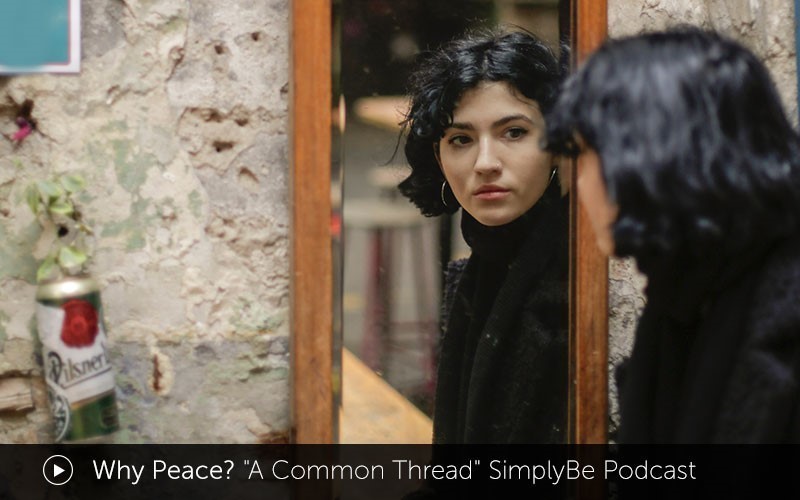Topics
 00:03:52
The Road Less Noisy
Video
Duration : 00:03:52
The road to less noise is so close. Here’s a 3 min. video to enjoy for the ride.
00:03:52
The Road Less Noisy
Video
Duration : 00:03:52
The road to less noise is so close. Here’s a 3 min. video to enjoy for the ride.
Prem Rawat: First of all, see if you can identify the noise. Do you get hit by the noise? We all do. Now, let’s see who’s in charge. Tell the noise to shut up. If it does, congratulations; you’re in charge. If it doesn’t?! You’ve got problems. You are not in charge—regardless of how successful you are. Regardless of what you have accomplished, you’re not in charge.
Do you have problems sleeping? Noise! Noise won’t let you sleep. It causes big health problems. Make a decision? It won’t let you make a decision! “No, no, but-but what-what about this?! What about this?! What about this?!”
Why did you miss your flight? Because of the noise. And now who’s bothering you that you missed your flight? I mean, and look, it’s done! Right? The plane is gone. There is no way that plane is coming back to pick you up. If it does come back, you don’t want to be on it. It only came back because it’s broken, and so they’d have to return.
It’s not like the goodness of the captain’s heart, “And so, you know, we left somebody, but and let’s go back and get ‘em.” Nope. The airlines would fire the captain. “Who’s going to pay for that extra fuel?”
So, who is in charge? Now, what am I actually saying to you? And what I’m actually saying to you is you should be in charge. It’s your life; you should be in charge. But the problem is, you’re not. And that is the issue of the noise. It doesn’t let that peace manifest.
And we get so used to it. This is our problem; we get used to things; we get used to the noise, and we’re like, “Oh, it’s okay.” Then we’ve got a problem. Then we’ve got a real problem.
So, all of these things, you know, and these are the decisions that I think we have to make; that’s why we need to be proactive in our lives!
 00:03:52
Keep the Good
Video
Duration : 00:03:52
Life should never be about three things only…Life is giving you a lot more than ...
00:03:52
Keep the Good
Video
Duration : 00:03:52
Life should never be about three things only…Life is giving you a lot more than ...
What do you focus on every day? Is it things that make you angry? Is it things that you don’t like in your life? Are you a complainer? Do you complain, “This isn’t right; that’s not right. This should have been this way; that should have been this way; why is this this way; why is that that way? And, ababla-bla-blable, ablabla-blablalba.....”
“Why me?” Are you one of those “why me’s”? So, if you are a “why me”—good luck. That’s not a nice note to end with, “Why me? Nothing is right. Why is everything so unjust?”
Remember Yudhishthir! Same thing, he’s caught in the injustice and he cannot go. He’s caught. The cycle of birth and death, the inconvenience of the birth, and he’s caught in it. Because he’s also caught in his concepts of “what is right, what is wrong, what is right....”
He’s caught up in his concepts of what is right and what is wrong. And this is then driving him to start looking at what is just and what is unjust. And so far he’s going in his life, going, “This is just; this is unjust; this is just; this is unjust,” he’s caught in fear; he’s caught in anger; he’s caught in all those things that he doesn’t really want.
When he frees himself from that, severs those.... I like the word “sever”; just to, “Kkkch,” indiscriminately. Not like, “Where should I do it?” No, just do it. It doesn’t really matter, if you’re going to cut a rope, whether you cut here or you cut it—and just cut the thing.
And then, then that comes; then comes the freedom. Then comes the freedom. And the freedom? And, when you are free, you can feel. Now you are free to feel this life; now you’re free to feel the gratitude; now you’re free to feel what that beauty is.
The life should never be about, you know, three things only. Life is giving you a lot more than three. Take it all! “No, no, we should only have....” Not one.
“What is the most important—well, what is that one most important thing to you?” God knows who started that. But it’s the same people who said, “Take that little ball and put it in the little hole.”
Trying to explain to the aliens, you know, again, “Yeah, they just—somebody has four important things, but this guy only wants three!” I won’t mention your name, Mitch, in case there is an alien.
So, just to keep that focus and continue to enjoy this life, this is what it is. And that is the best way to pay the tribute to what is the past—whatever you have learnt that is good, keep it, and move forward with it.
- Prem Rawat
 00:05:50
Coming and Going
Video
Duration : 00:05:50
Is the blessing of each breath obvious to you every time you breathe?
00:05:50
Coming and Going
Video
Duration : 00:05:50
Is the blessing of each breath obvious to you every time you breathe?
Whether Ram actually said this or not is irrelevant. And I am sure that Ram is not the one who sat down and wrote this. But he says—and this is obviously in some understanding on Ram’s behalf, some conclusion that this writer has, in which he says, "This is the vessel to go across the ocean of this world."
"What ocean?" Right? Ocean of ignorance. "This form that you have is the vessel to go across this ocean. The coming and going of this breath is my blessing. Coming and going of this breath is my blessing."
Wow. Wow. Wow, hmm-hmm. Coming of this breath, going of this breath is the blessing?
Is that obvious to you? Don’t shake your head yet; the question isn’t finished yet—is it obvious to you every time you breathe? Because it still is a blessing.
And this you have to feel in your life, acknowledge, understand in your life. No doubt. Not taking my word for it. Experiencing it for yourself, knowing—that’s what Knowledge is, hmm. Not reading in a book.
Because, putting something down in a book, it’s a real challenge. For me, it’s a real challenge. Because here I am offering words, but I’m also the same person who offers experience. And it’s a real dance! It’s a real dance. What can only be experienced should not be written about. And that’s a hell of a discipline—but it must be experienced.
I’m in a unique situation; I know that. If somebody comes to me, and says, "I have heard this thing called a 'mango.' What is it?" I am one of those people who doesn’t have to hand this person a book. I can hand him a mango.
There are other people who don’t have a mango; they can only offer him a book. But I am, it's slightly different; I have a slight different advantage; I can hand a mango. And hopefully, you're here to taste the mango.
- Prem Rawat
 00:08:13
Why Peace?
Video
Duration : 00:08:13
If we understand who we are as a human being, we can understand our limitations,...
00:08:13
Why Peace?
Video
Duration : 00:08:13
If we understand who we are as a human being, we can understand our limitations,...
Jessica Zweig:
I think it’s also gotten a lot more difficult to get in touch with who we truly are because of the sheer noise of life—technology, opportunity. The desire to know oneself is sort of trendy today. And I think that, in and of itself is overwhelming for people.
So, how do you tap in? What would be the first step?
Prem Rawat:
You’re absolutely right! People are so caught up in everything else that they have forgotten who they are. And so our journey must begin with first establishing base with ourselves—not with other things, not with other solutions, but with us, with us, just as an individual, just as who you are.
Continuing onscreen text:
SimplyBe. Podcast
Jessica Zweig, Host of The SimplyBe Podcast.
Interviews Prem Rawat, Author & Global Peace Ambassador
The SimplyBe. Podcast is a collection of conversations about building a business by knowing WHO YOU ARE at your core, and showing up as your true, unapologetic, authentic self.
Jessica interviews thought leaders, CEOs, and some of the most magnetic personal brands of today.
A Common Thread
Jessica Zweig:
Welcome to my show Prem; thank you so much for being with me today.
Prem Rawat:
It’s a great pleasure to be with you and with your audience and to share some insights. I’ve been doing this for quite a long time, and it’s just wonderful to help people all around the world who need help, who want to take some help.
Jessica Zweig:
I could not agree more. And it is; the honor and privilege is mine. I know you have a prolific career, over fifty years traveling the globe, speaking in over 250 cities, probably more, on this topic of peace and the universal desire that we all have for it. And I’d love for you to speak to that—why, why peace, Prem?
Prem Rawat:
Well, but, you know, so much of the education that we receive.... Because everything that we think we know is really something that has been added to us; this is not fundamentally what we knew when we were born.
We knew one thing when we were born, which is, "Give a cry if you need something, and if you are happy, go to sleep." And that’s how our lives actually started. And then it’s like, "Oh, I have to do this; I have to accomplish this; I have to succeed in this." All this was learnt later on.
And what does it mean when we learn all these things? Do we make a separation between these things and who we are? We don't! We think, "This is my idea; this is what I have to do." [Jessica: Umm.] And on we go!
And then, before you know it, we find ourselves in a very complicated situation. And the situation might be that we even have a job that’s bringing home the bread and butter, but we hate it; we hate it. And we hate going to our work every single day.
And there we are, caught in this paradox of “What do I do now?” Because I know that I have to get bread and butter home; maybe there are other people in my household who are relying on me to bring that bread and butter home, but something in me doesn’t want to do it. I don’t enjoy what I’m doing; I don’t enjoy being who I am; I don’t enjoy—"This is too much pressure; this is too much...."
And a lot of people, they go, "Okay, ahh...." All of a sudden one day, they find themselves walking on a road. And they find that a shoe that they’re wearing is full of a very sharp rock.
And instead of taking the time to remove the rock from the shoe and comfortably go on walking, they are like, "Well, give me an aspirin; give me something that’ll take away my pain; give me a band-aid; give me something because this is horrible."
And somebody comes along and says, "Well, you know, why are you taking all this medication? Why are you doing all this? Do you know why you’re doing this, because you don’t have to. All you have to do is take away that rock that’s in your shoe, and you will be comfortable again."
And sometimes it sounds so simple when you say it, but it's so complicated. With all the challenges that we have in our life, we find ourselves nailed against the wall sometimes. And we’re looking for a solution out of this misery. And yet it's just like, the more solutions we look to, the more complex those solutions are.
You know, it’s like, "Okay, sit down in a room—and don’t think about anything." And it’s like, "Control your thoughts."
And I remember, when I first came—I was a teenager when I first came to America; I was thirteen years old. And people much older than me and much more educated than me would sit down and go, "Okay, how do I control my thoughts?"
I said, "Well, why do you want to control your thoughts? I mean, what do you think you’re going to gain by controlling your thoughts? Don’t you understand that the desire to control your thought is a thought in itself?" [Jessica: Right.]
You’re still attached to the thought, and you’re going to be sitting there in some room, going, "Am I controlling my thoughts? Have I controlled my thoughts? Have my thoughts gone away?" And you’re going to be thinking about your thoughts going away. And so, how have you become thoughtless? You’re not thoughtless; you're still thinking.
And that just goes to the quintessential essence of it. Because we need to understand who we are as a human being. And if we understand who we are as a human being, we can understand our limitations, and we can also understand our strengths.
And this is what we don't know; we don’t know our strengths, but we finally have learnt our limitations. [Jessica: Yeah.] And the world is frustrated because of that.
Jessica Zweig:
Right. Well, I think it's also gotten a lot more difficult to get in touch with who we truly are because of the sheer noise of life—technology, opportunity. The desire to know oneself is sort of trendy today. And there are all of these different ways in which we can explore that. And I think that, in and of itself is overwhelming for people.
So, how do you tap in? What would be the first step? Because I agree with you; it's really, really simple—but it's still so hard for people.
Prem Rawat:
Yeah. And you know, it's like, in a way, exactly what you said and it's very true. But at the same time, it's like, "Well, I can't smell myself. I can smell the flowers and I can smell the bees and I can smell everything else, but I can't smell me."
And it's like, "Well, but excuse me. You don't know who you are? I mean, you are in you—and you are attached to you. And yet you are so alienated from you. How can that be?" Wait, what's going on here? What mirror are you looking at? Who are you looking at, if you cannot find yourself amidst this huge ocean?
And yet you are absolutely right. People are so caught up in everything else that they have forgotten who they are. And so, our journey must begin with first, establishing base with ourselves. Not with other things, not with other solutions, but with us, with us, just as an individual, just as who you are. Not how you should be—but who you are. [Jessica: Right.]
And begin with that—and that is the very first step.
 00:02:10
You Are Wiser Than You Realize
Video
Duration : 00:02:10
The wisdom you seek from the world is inside of you.
00:02:10
You Are Wiser Than You Realize
Video
Duration : 00:02:10
The wisdom you seek from the world is inside of you.
Comedy or humor has a bit of truth—otherwise it’s not funny!
And it is funny that in everything else, in everything else that we do ... You go to a bank? The line, where it starts, we know. You go take a number, ticket number. You know—and you watch the counter, “Okay, what is the number?” So you know! And when it comes to the self, no idea!
And when I propose this, a lot of people go, “What do you mean, ‘Knowing yourself?’ Of course I know myself. My name is bla-bla-bla-bla-bla.” Really? Was that your name before you came out? When you were born, what was your name? Just when you were born?
Because you didn’t exist! Officially you did not exist; your birth certificate hadn’t been signed yet. You did not have a piece of paper validating you exist—but you existed. On what strength did you exist? Do you know what that is?
The wisdom that you seek from the world is actually inside of you. Do you know that? You are wiser than you realize. Do you know that?
So, if you don’t, don’t you think it’ll be good to know yourself? Then you would know who you are, the strengths you have, how you can go forward. And of course, when it comes to loving, if you don’t know yourself, how are you going to love yourself?
- Prem Rawat
 00:04:45
Your Inner Wealth
Audio
Duration : 00:04:45
We all have inner wealth, and the more you share it, the more it grows
00:04:45
Your Inner Wealth
Audio
Duration : 00:04:45
We all have inner wealth, and the more you share it, the more it grows
There was a man. He had saved up some money, and one day he came across a piece of land, and the piece of land had been totally abandoned. So he went to the owner and he said, “You know, you have this land. Could you sell me this land?”
And the owner realized he wasn’t using it; it was abandoned. So whatever little money he could get would be welcome. So he made a deal and sold the land pretty cheap. Well, the man got the land. He went in; he started to clean the land. Picked the rocks, put ‘em aside; started to plow. He took care of the land. He plowed the field.
And before you know, he had a beautiful crop. And more he took care of the land, the better his crops were. And he started to get one crop, and then second crop, and third crop, and he just was taking four crops. And soon he saved the money and he became rich.
He got married; he had children, built himself a beautiful house—saved, saved, saved, and he bought gold with the money he saved. He took all the gold, which was substantial, that he had saved and he put it in a box. And he took the box and he buried it in the field. But he didn’t tell his children.
When the time came for him to die, he called all his family and called his children, and he said, “I am going to give you one piece of advice. And if you follow my advice, you will never be poor. And my advice to you is, ‘plow the field.’ That’s all.” He died.
The children were not into plowing the field. They wanted to live in the city; they wanted to have parties; they wanted to have everything else happening. They were not interested in being a farmer.
So, the land fell in disrepair. Weeds started to grow; people started to throw garbage on the land. Years passed by. One day a man came to them and said, “You know, you have this land—it’s completely abandoned. Sell it to me. This is all the money I have.” He had a little bit of money. He said, “Sell it to me.”
The children looked at each other and said, “Yeah, we’re not using it. At least we’ll get a little bit of money from it; that’s good.” And they always kept wondering, “Why did father say, ‘Plow the land and you will never be poor’?” So, the question in the back of their mind...but, they were happy to sell the land and get rid it.
The man who bought the land, he went in, and he plucked the weeds; he threw away the garbage, started to take care of the land. And one day he plowed the field. And when he did, guess what he found? He found the box with the gold.
You are the field, and in this field there is a box. And in this box there is a wealth, and this wealth is more expensive than gold. It’s more expensive than diamonds. There is a wealth—a wealth that, more you share it, the more it grows. There’s no wealth like that in this world except this inner wealth that you have. More you share it, the more it grows. What a wealth.
Some people say, “Oh, destiny! It’s just destiny.” And I say, “Choice.”
– Prem Rawat





